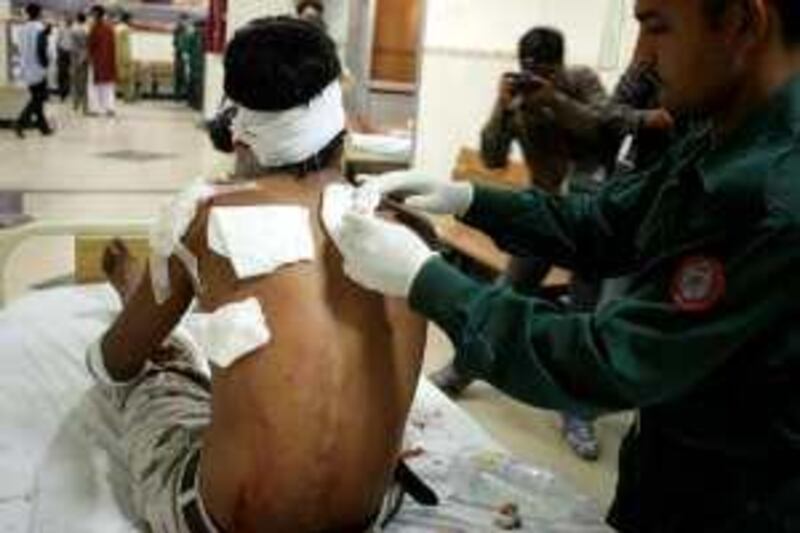ISLAMABAD // Pakistani officials denied yesterday that a terror suspect arrested in recent days in Karachi was Adam Gadahn, an American-born al Qa'eda spokesman who is listed on the FBI's most wanted list. It came as a suicide bombing killed 13 and injured 67 in Lahore.
Intelligence officials, speaking on condition of anonymity, have identified the suspect as Abu Yahya Azzam, an Egyptian-American al Qa'eda operative involved in fighting in Afghanistan. The back-pedalling came a day after Pakistani newspapers, citing several US media outlets, ran front-page stories about the arrest of Adam Gadahn, 31, a native of California who has appeared in several al Qa'eda propaganda videos urging Muslims to target the US.
While intelligence officials contradicted earlier reports of Mr Gadahn's apprehension, publicly Pakistani officials remained tight-lipped over the identity of the recent arrests. Rehman Malik, the Pakistani interior minister, told reporters in Islamabad yesterday that some arrests had been made in Karachi but that the identities of those taken in were still being ascertained. Mr Gadahn was charged with treason in 2006 by an American court and faces the death penalty if convicted. He moved to Pakistan in 1998 and worked as a translator for al Qa'eda. He became known for his video broadcasts in which he lambasted the United States in his American accent and called on Muslims to join jihad.
In his latest video message, he urged Muslims to follow Major Nidal Malik Hasan, the US army officer charged with killing 13 people in Fort Hood, Texas, in November. The arrests over the weekend that netted Mr Azzam were made in the outskirts of Karachi, the volatile southern port city where a number of top Taliban and al Qa'eda leaders have found refuge. Last month Mullah Abdul Ghani Baradar, the No 2 official of the Taliban, was arrested in Karachi in what is being described as a major success and reflective of a policy shift by Pakistani intelligence agencies. However, Pakistani officials have resisted demands by Afghans to hand over Mullah Baradar and a Pakistani court last month ruled that he could not be transferred to Afghanistan. His capture followed about half a dozen arrests across the country of senior and midlevel Taliban leaders.
"There's no love lost between the Pakistani state and al Qa'eda - the security guys get them when they can and wherever they can," said Cyril Almeida, an editor at Pakistan's leading daily Dawn."Much of it depends on the availability of actionable intelligence. "The flurry of Afghan Taliban captures, though, raises an interesting question: has the Pakistan army changed its strategy or has it amended its tactics?
"For now it seems more of a tactical thing - enhanced co-operation with the Americans is yielding dividends in Pakistan's bid to dismantle parts of the Pakistani Taliban." While much of the Pakistani Taliban leadership was based in the restive tribal regions straddling the border with Afghanistan, most of the al Qa'eda and Afghan Taliban leadership have found sanctuaries in urban areas. "Karachi remains the great mystery - not so much about if there are militants hiding here but more about why it has remained relatively free of violence," Almeida said.
"Theories abound - the city is a transit point, it's a lucrative 'fund-raising' centre, it's used as a sanctuary that the militants don't want to draw too much attention to, etc. But I don't believe anyone truly knows why. Perhaps the new captures may shed some light on this mystery." Also yesterday, a powerful suicide car bomb rocked the eastern city of Lahore, killing at least 13 people and injuring at least 67 others, according to police officials. The target of the early morning attack was a Pakistani security agency's interrogation centre in the posh Model Town neighbourhood.
The Pakistani Taliban claimed responsibility, according to media, saying it was retribution for US and Pakistani military offensives in the tribal areas and pledging further attacks. At least 50 people were thought to be inside the building, which collapsed, leaving several people trapped under debris. Several pedestrians, including women and children, were also wounded. "Important terrorism accused were kept here for interrogation," Pervez Rathore, the Lahore police chief, referring to the targeted building.
foreign.desk@thenational.ae





